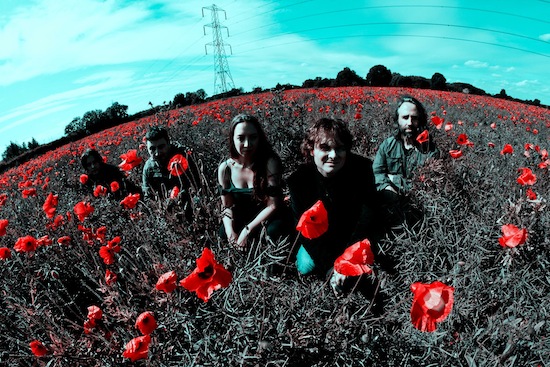Nick McCabe is one of the greatest guitarists of his generation. The only person who might argue the toss over that proclamation is the man himself, who is often humble to the point of seeming to disregard his own talent. (Simon Jones, bass player in The Verve, once implored a guitar journalist to tell him how good he was: "I think he’s the greatest guitarist around and he won’t have it. Tell him he’s amazing!") McCabe’s place in musical history is guaranteed – as part of The Verve he inspired awe with his incredible guitar playing, somehow overshadowing frontman Richard Ashcroft’s planet-sized ego. Ashcroft acted like he was the focal point, but the majority of eyes were on McCabe – how the fuck did he make his guitar sound like that? McCabe was the sonic architect of the Verve’s sound and while the music the band made may have drifted from the celestial space-rock and ambient doodling of A Storm In Heaven towards the more prosaic "classic" rock sound of Urban Hymns, McCabe’s fretwork was always dazzling. Never one to strive for technical excellence, his favourite guitar players are the idiosyncratic ones – Funkadelic’s Eddie Hazel, Vini Reilly of The Durutti Column and John Martyn.
McCabe grew up in St Helens, Lancashire, in a family of music lovers, starting out under the influence of the records brought into the house by his older brothers. "I was lucky that there was a surfeit of music in the household," McCabe tells me, over the phone from his home in Shropshire. "There was a real diversity. My eldest brother was into Northern Soul and metal – you couldn’t really have got two more polar opposites. So he had Aerosmith and Led Zeppelin records, and then all this Northern Soul. Then my other brother was a product of his time really – he was a Pink Floyd fan who was into punk."
But McCabe was soon developing his own tastes. "There were a couple of moments in time where it suddenly became my thing, rather than something inherited from my brothers," he reveals. "That became really important to me. A lot of my life I’ve had the younger brother syndrome, being in the shadow of… literally as well, because physically they were the sporting types. I was the runt really. So it was really important to me to find something of my own."
That something came when he got into electro music at school in the early 1980s, following that movement into Detroit techno and then Warp Records, with a particular love of Autechre. This may not be reflected in the music he has made up to this point, but he says that, "I wouldn’t play the guitar the way I do were it not for the fact that I like electronic music so much."
He also discloses that he has a vast backlog of electronic music that he has made over the years that has never been released. "I always kept the two strains separate in The Verve," he explains. "I didn’t want to confuse matters. Plus I’ve always been worried that I’m a dabbler or a dilettante or whatever and my lack of confidence has stopped me from seeing it through."
This diversity is perhaps more apparent in his latest musical project. McCabe has formed Black Submarine (formerly Black Ships) with Simon Jones, the former Portishead drummer Mig Schillace and Davide Rossi, strings visionary for Goldfrapp and Coldplay, whom McCabe and Jones met during the recording of The Verve’s swansong, Forth. An initial plan for a Massive Attack-style revolving roster of singers was abandoned in favour of permanent vocalist Amelia Tucker. The heavier, rockier side of the Massive Attack oeuvre isn’t a bad reference point for Black Submarine’s brand of murky, string-laden psychedelic trip-hop, with elements of folk, electronica and even industrial thrown into the melting pot.
"It encompasses genres rather than switching between them I think," McCabe says of the band’s debut album New Shores. "There’s an element of confusion about the record that we might have tried to squash in an earlier lifetime, but now we kind of embrace it. It’s more honest."
There are elements of confusion in McCabe’s choices for his Baker’s Dozen. It reflects his diverse tastes – Funkadelic to Steve Reich; John Carpenter to Mobb Deep – and eschews records by The Beatles, Stones, Dylan and VU that are usually commonplace on lists like this compiled by his contemporaries.
"I think everybody goes back and does their homework. We definitely did that in The Verve. You want to find all the best stuff and you want to be an expert in your field. So you go back and find all these incredible, classic records. And while it would be nice to say that you weren’t listening to The Human League in 1982, and that you were actually listening to something that is now in the pantheon – the canon – I may as well be honest about it. These are the records that were important to me, the pivotal ones."
New Shores by Black Submarine is out now via Kobalt Music; click on the image below to begin scrolling through Nick’s choices


